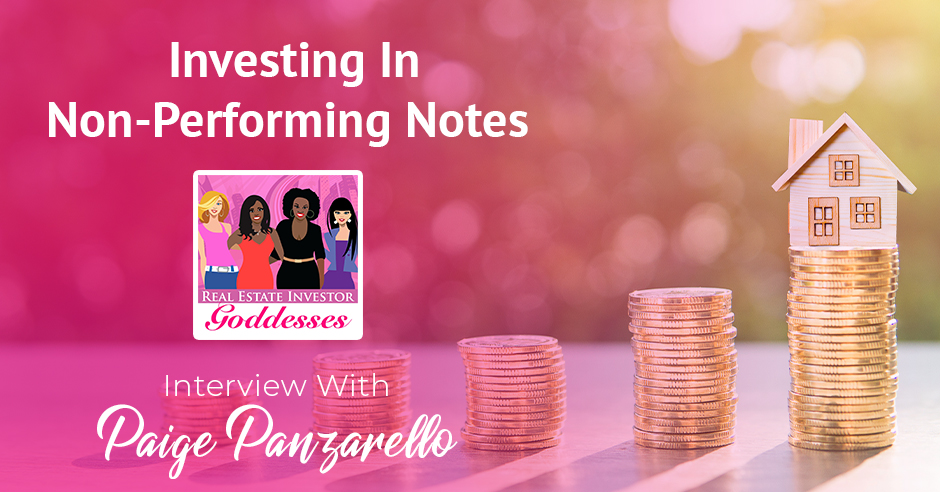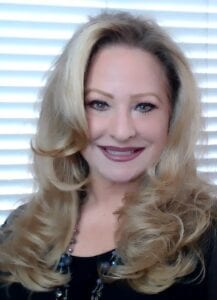
A lot of times, success in real estate investment is about finding the right asset class for you and doing well in that niche. For Paige Panzarello, that niche is investing in non-performing notes. Known as the Cashflow Chick, she joins Monick Halm to explain why this kind of investment is not as ridiculous as it sounds. Paige has been a real estate investor since her younger years and has had a ton of experience, including a particularly devastating loss during the crash of 2008. Her story of bouncing back from a state of utter destitution is an inspiration for young women who are just starting out in real estate.
—
Listen to the podcast here:
Investing In Non-Performing Notes – Interview With Paige Panzarello
I am here with another incredible guest. At Real Estate Investor Goddesses, we bring you incredible women real estate investors to come and share their stories, successes, and even some of their mistakes with us, and our guest has an incredible story. Paige Panzarello who goes by the Cashflow Chick is a real estate investor and entrepreneur with over twenty years of experience in many different forms of real estate investing. She focuses on nonperforming notes that she purchases all across the United States.
She teaches a workshop that details how to buy nonperforming notes, what to look for, due diligence to perform, and how to mitigate risk. Having experienced the crashes of 2008 in what she calls a difficult learning experience, she knows firsthand how life can happen. Her company was founded to help people in distress. People first, profits second. She’s going to tell us about her story and also what nonperforming notes are. We’ll get into it and we’ll tell you at the end how you can find out more about her. I’m excited to have you. Welcome, Paige.
Thank you, Monick. I’m pleased to be here.
The pleasure is definitely all ours. You told me your story. We got on the phone and I was on the floor listening to your story, which is incredible. Share with our audience how you got started in real estate? How did you get into this? It’s amazing.
It is tremendously rewarding for an investor to be able to help people while making money. Share on XI was thrown into the deep end of the pool by virtue of inheritance. Unfortunately, my grandmother passed and she had an estate full of real estate which was tremendous. We had some townhome units, lands, even had a sewer treatment plant and a couple of strip malls. Unfortunately, they were all underperforming, needed work and they weren’t producing money. As a matter of fact, we were severely in debt. My family and I dug in and put a lot of sweat equity and dollars into it. We were able to turn those properties around within a three-year period of time and bring them out of the red and into the black which was tremendous. It’s a huge learning experience for me.
I know more about sewer treatment plants than I ever wanted to, but it was a fascinating time of my life because it wasn’t something I was expecting to do. When we went into it, I learned a ton. Primarily with the townhome units, we had 38 townhome units. I learned quickly that I am not a good property manager. I’m a good landlord, I should say. I’ve got a big heart and everybody’s got a story. I realized I needed to put a property manager in place to run those. It was a fascinating time but I decided that unfortunately because the area was small and boutique where we were. We were in Arizona. The people that live there couldn’t afford the rents that we needed to charge. We decided that it was time to start selling those units and start developing on the land.
My family wanted nothing to do with that so I went to them and I said, “I’d like to buy the company.” Long story short, I bought the company from my family and I started to develop a plan to develop the land. I realized that the contractors were going to be making money hand over fist and that they were inappropriately charging me. I decided it was time to start a construction company. I knew nothing about construction. I was younger and had a lot more tolerance for risk at that point and we grew fast.
I was fortunate in that I surrounded myself with people that I asked lots of questions. I put people in place that were in the know and could help me and I leverage their knowledge so we grew fast. We grew to the point that we had 36 employees. We held all of our construction licenses, including commercial with the exception of HVAC and roofing. The only reason we didn’t have those was that the liability insurance was too much. We built big projects. We built and developed other people’s projects, our own projects, and we were rocking and rolling.
I was having the time of my life. I was young and at that point, I was single, financially well-off and I was having fun but I was also working hard. 2007 and 2008 came and honestly it was brutal because it all came crashing down. Everything froze so everybody that owes money, they couldn’t pay me. I owe people money. I was fortunate that I had a lot of assets at the time. I was liquid and I was not over-leveraged so I only had encumbrances of about 8% to 10%, which allowed me to fire sale everything and is able to pay everybody off without having to go into a bankruptcy situation.
At the end of the day, it took me about three years to get everybody paid and finalize everything. At the end of the day, I literally walked away with nothing and I had lost at that point $20 million. I went away for a little while. I did a couple of things for me. It allowed me to be with family because I was away from family for a long period of time. It allowed me to come back home to California and be with my family. I met my husband and we were clearly back into real estate because he recognized early on that real estate is my passion and he told me, “Paige, this is what you need to do. This is what we need to do and we need to get back into it,” and so we did.

Non Performing Notes: When you invest in non-performing notes, you are mitigating your risk because you are buying them for a very deep discount.
Tell me how old you were when you first got into real estate because you were quite young.
I was. I bought my first house at 23 years old and I came back. When my grandmother passed away, I turned 26. I was a young 26-year-old when I first started.
I love that your grandmother was a real estate investor goddess. It definitely was in her blood and you’re the first person I have met who owned a sewage treatment plant so that’s something to say.
It is interesting and challenging. I will say that.
You have this incredibly varied experience where you’re in townhomes, single-family, residential, strip malls, sewage treatment plants, and construction. You do a lot of it and then 2008 happens with all of that craziness. You get back to real estate and now what is your focus?
I focus on nonperforming notes. When I first got back into real estate, we did a lot of fix and flips and some wholesaling, because that’s a great way to build your network. I’m a huge believer in that because real estate is a team sport so we did some of that. I’ve done tax liens and tax deeds. I was looking for that right space for me. When I came across notes, I met a gentleman who became my mentor and subsequently has become my business partner. I found nonperforming notes and angels sang for me. They don’t fit everybody, but for me as an investor, it completely fits all of the profiles and all of the things that were important to me. That’s where I landed and that’s where I’m staying.
Tell people what is a nonperforming note exactly. Why do you like that as an asset class?
Most people when they buy a house they sign a promissory note promising to pay the bank back the money that the bank puts forward for you to buy the house. In order to collateralize that or secure that promise to pay, they will also sign either a mortgage or a deed of trust so those documents go together. When we say notes, it’s literally the promissory note or either the mortgage or the deed of trust depending upon if you’re in a judicial or non-judicial foreclosure state. They’re generally called notes. Nonperforming notes are notes or mortgages that the borrowers have stopped paying, which seems ridiculous. Why would I spend my money and invest in mortgages that are not paying? The reason that I do that is, first of all, we buy them for a deep discount thereby mitigating our risk because we’re building in equity.
If I buy a note at a 40% or 50% discount, I now have a cushion of 40% or 50% that mitigates my risk so we can buy them in at a deep discount. I control the outcome because I become that borrower’s bank. The reason it fits my model and why I like this asset class is because I have 23 different exit strategies at my avail instead of 1 or 2 so there’s a lot of flexibility there if things change in the market or if life happens to anybody. I don’t have a loan because we pay cash. I am the loan. I become the bank so I can control the outcome. I’m not settled into one specific location. I can do this business from anywhere in the world as long as I have a phone and an internet source. I get to help people, which is tremendously rewarding for me as an investor. I could go on and on about why I love this space.
It’s never a failure if you learn from it. Share on XTalking about how you can help people because when you buy these nonperforming notes, their goal is not to evict or foreclose upon the people. What are some exit strategies that can be particularly win-win?
Regardless of whether we can help the borrower stay in their home or not, we try to create a win-win situation for everybody. Sometimes that means that the win for the borrower is not staying in the home. Our goal whenever we buy our notes is, first and foremost, if the borrower wants to stay in their home, working with them if they qualify to keep them in their home. Sometimes it’s not always possible. Sometimes it’s too heavy a burden for them and because we buy them at a discount. We have a lot of working rooms there that if they do qualify to stay in their home, we can do modifications to their loan, reduce their principal, forgive their arrearage, adjust their interest rate or their payment, or the length of time of the mortgage. There’s a lot of flexibility there in being able to work with the borrower.
If we can’t get that situation to happen, and usually it happens about a third of the time, we often will go into either a short sale situation where we work with the borrower to sell the home for less than they owe us on paper or we do what’s called a deed in lieu of foreclosure. The borrower sometimes will come to our loss mitigation team and say to us, “We can’t afford it. We don’t want to be here but we don’t want a foreclosure on our record so we’re willing to sign over the deed in lieu of you foreclosing on us and we will walk away. It will be considered paid in full. There are some pitfalls to that that you’ve got to look out for but if what you’re doing, that’s certainly an expeditious way of taking control of the property and doing whatever you want with it. You can sell it to a fix and flipper and be their bank, sell it to an end-user depending upon the condition of the home, you can fix and flip it yourself or you can fix it and rent it. There are many different options that are available to you as a note investor that I love.
You teach about this. You have a workshop that tells people how to buy these types of notes, look for due diligence, and etc. Share a little bit about how people can find out about your workshop.
We generally hold the workshop at least three times a year, sometimes four. You can go to BuildingWealthWithNotes.com and it will have all of the information about the live workshop. You can also go to CashflowChick.com and there’s some information there as well. There’s also an opportunity to book a 30-minute appointment with me to discuss some options you may have.
Back to your story because your story is fascinating. One of the questions that I always ask my guests is, what is your biggest mistake in real estate or in your investing career? What did you learn from it?
My biggest mistake was thinking that I could do it all myself. There’s always the fear of competition there and there’s always pride when that becomes involved. My biggest mistake was literally not reaching out to any type of support system. There wasn’t much of one when I started because I was a woman in real estate and it’s largely dominated by men. Even though I surrounded myself with men and I asked them significant questions, I didn’t reach out when I probably should have.
I also didn’t reach out to my network and my support system because at the time, it’s horrifying to know what you’re going through when you’re losing everything and that’s nothing that you want to share with people. Later in life, what I learned from that is I should have, could have, would have and now do have an abundant mindset because I believe in collaboration and in supporting one another. I don’t view it as a competition. I do view it as collaboration and that has opened more doors than I can tell you. It’s been amazing.
When you were thinking you could do it all yourself and in particular, it sounds like you’re talking about that 2008 period when things were crashing down and you’re trying to keep it together and not sink all the while.
I was young, the president of the company, and I had 36 employees. I did not bring in a support system to help me enough there either. I wanted to maintain all of that control and as such, I was working seven days a week, about eighteen hours a day and it was putting me into an early grave.
Maybe that 2008 was a gift that came wrapped in sandpaper. It’s a tough gift but it got you out of a situation that might not have been sustainable.
I am proud of the fact that as difficult as it was and most people call that a failure and I don’t. It might not have the outcome that you wanted but if you learn from it, it’s never a failure. It’s an incredibly difficult learning experience and that’s how I refer to that time in my life. I’m proud of the fact that I never gave up and I paid back all of the people that I owed, including my investors. I still have investors to this day that invest with me because of that. I didn’t let it break me and I’m proud of that.

Non Performing Notes: Decide on what you seek to have real estate do for you, and then find the avenue that is going to do it for you.
My next question is, what are you most proud of?
There you go. That would be it.
To what do you attribute your success, 2008 notwithstanding? You’ve had an incredibly successful career.
I put myself in the room with people that are smarter than me and I am not afraid to ask questions. From that, I learned every day even to this day. Pay attention to those incredibly difficult learning experiences, because those are your biggest teachers between all those things that have propelled me into the place I am now.
I love being around people that are smarter than you and asking lots of questions. I completely agree with that. That’s what I would do. It’s partly why I do this show so I get to ask questions from incredibly successful women like you and learn by your successes, your mistakes, and where you’ve gotten. I totally and wholeheartedly agree with that. It is a good recipe for success. What advice do you have for a woman who’s starting out in real estate investing?
Here’s the thing, real estate, just like about anything has a lot of shiny objects. There is a lot of information that’s out there. There is paid information and free information. You can get overwhelmed with all of the different options that are available to you. I often talk to people that asked me this question, people that approached me, or came to the workshop. I often talk about, and you’ll hear this from a lot of people, what is your why? That’s a personal thing. I like to say, “What is your what?” The reason that I say that is because depending upon whether you need to generate monthly cashflow, chunks of cash, and looking to have a depreciating asset because you have too much cash, that’s your what.
What do you need to develop? What are you seeking to have real estate do for you? You find the avenue and the medium that’s going to do that for you. If you need passive income, because you want to have that little extra monthly, you’re not going to go into a fix and flip situation. First of all, it’s a short-term play and passive income is a long-term play. Fix and flip generates chunks of cash and passive income and buy and hold generates monthly streams of cash.
Know what your what is because that is going to guide you into the vehicle and the avenue that you’re going to seek and you’re going to start learning about that. Step two is educating yourself. There are lots of free advice and mediums out there. Podcasts are big and REI, Real Estate Investor Groups, are another big one. There’s also BiggerPockets. There are many resources that are available to you for free. There are also free seminars. If you’re going to do that, there are some good ones out there but do your due diligence first. Education is the key after what your what is, but you have to know what your what is.
Don’t let the fear of failure paralyze you. Learn from it, embrace it, and you will go further than you can possibly imagine. Share on XI always like it when people ask me, “What’s my next step? What should I do?” Where do you want to go? If you say, “I want to go on vacation. What should I do?” Are you going on vacation to Hawaii, New York City, or the North Pole?” All of those are going to be different things to do. Are you staycating and you’re going to the next town? All those things will require you to do totally different actions so you need to know where you’re headed. You can figure out what steps to take and you can get the education. It’s good figuring out what that’s that helps you figure out the direction you need to go because that will direct the type of path you’ll take. What do you wish you’d known at the beginning of your career that you now know?
I’m thankful that I was in the position that I was in when I started my career, but honestly, I go back to that same thing of support and thinking that I could do it all myself. I wish that at the beginning that I had reached out to a support system. Things were a little bit different than they are now. There’s a lot more with meetups, podcasts, and mentors being more accessible. Also, being able to reach out to groups. There’s a fabulous group here in California. It’s growing to a couple of other states as well and will eventually be nationwide called WREN, which is the Women’s Real Estate Network and their whole mission is like yours, Monick, about empowering other women and getting them to take action. That’s what WREN is about. It wasn’t around when I was but now this is something to be able to reach out for support for these people, even if you don’t have it from your own family because that happens a lot. Reach out to these groups because they will support you. I wish I had known that when I started.
Speaking of WREN which is definitely an organization that has my heart because of the same mission as mine, which is to help, support, and inspire women to get into real estate investments. It’s what Real Estate Investor Goddesses is about. It’s creating the sisterhood. I love it and the event. Tell us a little bit about the WREN Ignite Event.
It’s called Ignite Your Fire Within and its purpose is to do that. I am fortunate to have been a part of WREN from the beginning. I am the Vice President. Our founder is a tremendous real estate rock star woman and a huge heart. We are having to Ignite Your Fire Within. We’ve lined a huge panel of amazing rock star women speakers. They have every different medium out there. A couple of the other ladies and I are going to be talking about notes and there are going to buy and hold ladies there, self-storage, private money lenders, hard money lending, and construction. They’re a tremendous group of women and they’re all going to be there to help, support, and talk about their experiences and what they can offer in terms of, “We’ve scraped our knees so don’t do that.” Leverage our experience.
It’s also one of those hands-on events where you’re going to be able to talk with the speakers one-on-one. Lunch is going to be served and there’s going to be a speaker at every table for lunch so you have one-on-one time with them which doesn’t happen at most events. We are also doing what we call WREN Gives Back, which we’re spotlighting a nonprofit organization, and this year, it’s the Women’s Club of Hollywood. They need our help and that’s where Jean Harlow went to school. It’s a landmark building and organization and we’re proud that we’re sponsoring them and giving some proceeds from Ignite to go to them because they need our help. For you as an investor, if you’re starting out, or if you’re experienced and want to broaden your network, you need to be there. Your experience level doesn’t matter, but your presence does.
I will be there and I look forward to meeting other real estate investors out there. To get information, where should they go? What’s the website?
IgniteYourFireWithin.com, we have a promo code. The ticket is normally $149. You can get it for $89 and you use the promo code, WREN Promo, and that will get your ticket for $89, which is a fantastic event.
I’ll be there. We’re going to end with a trinity. Paige, what are you bragging about? What are you celebrating?
The growth and success of my business. When I embrace that collaborative, abundant heart mentality and the support system mentality, doors have absolutely opened. My network has grown and my connections are amazing. We’re elevating to the next level and we’re bringing people with us, which is tremendous. It is satisfying for me to be able to help others and we’re doing that.
What’s one thing you’re grateful for?
It’s going to sound odd, but it’s my big and difficult learning experience. Some would call it the failure but that’s the learning experience that propelled me and guided me to where I am now. Had that not happened, I would not have met my husband, I wouldn’t be where I am, I wouldn’t be sitting here talking with you, Monick, so I’m grateful for that.

Non Performing Notes: Find support systems. Reach out to groups that will truly support you.
I don’t think that’s weird at all. I won’t call it a failure unless you miss the feedback. It’s not a failure, it’s feedback. If you miss the feedback, it’s a failure, but otherwise, it’s feedback. Lastly, what’s one thing you desire?
If people have a desire or a dream, my desire is that they follow it. I hope that people don’t let the fear of failure paralyze you, because a lot of people are. They’re paralyzed in their fear. Let me tell you, and Monick, you know this as well as I do. Successful investors become successful because they fail. Don’t let fear paralyze you. Learn from that, embrace it, and you will go further and further than you would even possibly imagine.
I will share that desire to all the women reading and men, I know there are men that are out there reading too, as you also follow your dreams so shall this desire be or so much better than we can imagine under grace and in perfect ways. Thank you, Paige. This was incredible. You can reach her at CashflowChick.com and you can reach me at RealEstateInvestorGoddesses.com or on Facebook at the Real Estate Investor Goddesses page. Join us next time where we bring you another incredible real estate investor goddess’ success story. Thank you.
Thank you.
Important Links:
- Paige Panzarello
- BuildingWealthWithNotes.com
- CashflowChick.com
- WREN
- Ignite Your Fire Within
- Women’s Club of Hollywood
- IgniteYourFireWithin.com
- Real Estate Investor Goddesses – Facebook
About Paige Panzarello

Born and raised in Chicago, a political-science graduate of SIUC. My real estate career began as a college student in 2005 at age 20. I have done both rentals and flipping, my portfolio consists of properties with a mix of multi-family, commercial and single-family. My competitive edge is building a real estate portfolio by buying undervalued distressed properties.
This passion birthed my first book “Real Estate & Chill “ and I have added the title author to my two sons Benjamin 9, and Franklin 6, we have a children’s books series, Little Owners teaching kids about investing.
Love the show? Subscribe, rate, review, and share!
Join the Real Estate Investor Goddesses Community today:





